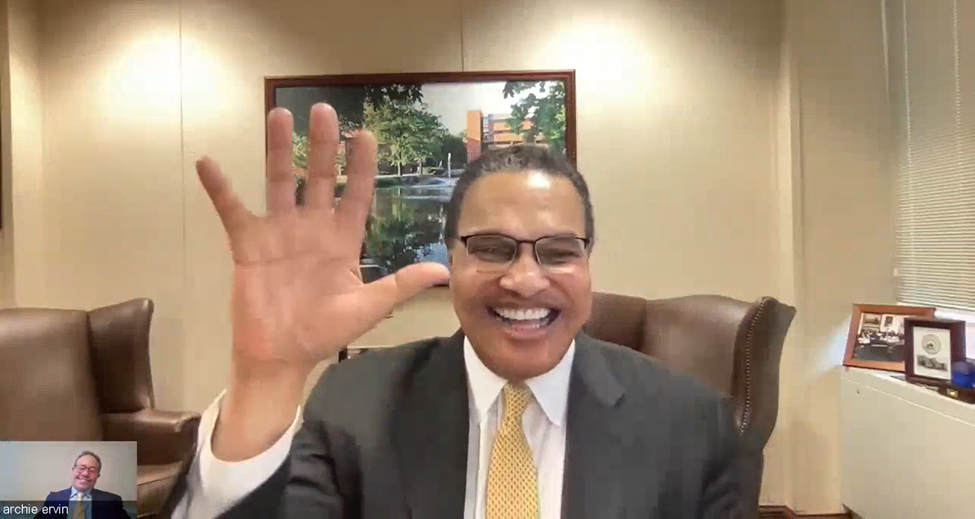On Jan. 12, Tech hosted the 11th annual Martin Luther King Jr. Lecture, featuring Dr. Freeman Hrabowski, President of the University of Maryland, Baltimore County (UMBC).
The event was sponsored through a partnership of three groups: the MLK Planning Committee, Institute Diversity, Equity, and Inclusion (IDEI) and the Division of Student Engagement and Well-Being.
Approximately 300 individuals from around campus watched the online lecture.
The presentation began with a brief introduction by Dr. Archie Ervin, vice president of IDEI.
Afterwards, Tech President Ángel Cabrera offered remarks and greetings of welcome to Hrabowski on behalf of the Institute. Cabrera first described Hrabowski as his “personal role model” and “dear friend” while explaining their shared uncommon backgrounds that lead to their current roles as university presidents.
Cabrera then discussed Tech’s progress over the years in diversifying its affiliated population.
“Georgia Tech has never been as diverse. Georgia Tech has never been as inclusive as it is today, and Georgia Tech has never been as successful as it is today,” Cabrera said.
Despite this advancement, Cabrera stated that there is more work to be done in making Tech an inclusive campus for everyone.
“We are not even halfway on that journey. It is up to each one of us. We have the responsibility to make sure we keep the doors wide open for talent of all kinds,” Cabrera said.
Speaking after Cabrera, undergraduate Student Government Association (SGA) President Samuel Ellis, fourth-year INTA, echoed similar sentiments.
“Over time, we’ve made strides towards justice and equality, but there remains work to be done,” Ellis said.
“We have to create a community where all people — no matter who they are — can see themselves at Georgia Tech. We must show everyone that they are valued … With the skills we gain at Georgia Tech, we have a unique opportunity to combine the powers of love with the capabilities of scientific development to combat injustice.”
Following Ellis’ remarks and a brief introduction on Hrabowski’s background by Rebecca Hammond, GMC graduate student, Hrabowski began his presentation.
“The MLK celebration … is a time when we think about who we have been and who we’re becoming,” Hrabowski said, first commending Tech for its progress throughout the years and then stating there is always more to be done.
Hrabowski initially focused on the cyclical nature of human existence.
“‘Everyone is a genius when looking backwards. But true genius is to anticipate what’s before you and to learn what was behind you,’” Hrabowski said, quoting his friend Rod Atkins, who has ties to both Tech and UMBC, to frame the conversation.
Hrabowski discussed some of his difficult experiences as a child-leader growing up in the Civil Rights Era in Birmingham, Ala. to demonstrate the progress that society has made since his childhood.
He then discussed some more recent events such as George Floyd’s death and the violence at the Capitol last year to demonstrate that progress is never linear.
To get past these difficult times, Hrabowski said, “People pull together in different ways to say that we are better than this … It is up to each of us to make that difference which will become so important.”
Hrabowski then shifted to discuss the need for both STEM and humanities experts and the need for more minorities in both of these areas to meet society’s needs today.
“The idea that STEM is critical in our society has never been more important. But I would also argue the concept of the humanities, the social sciences, the arts … is more critical now also,” Hrabowski said. “It is not one or the other. We need more people from all backgrounds who are in both areas.”
Hrabowski concluded his presentation with a challenge to the Tech community.
“In terms of producing Blacks who go on to get PhDs in the natural sciences and engineering right now, [Tech] is number 18,” Hrabowski said. “You are so good, Georgia Tech. You should be at the top of that list.”
Currently, UMBC ranks highest in the country in graduating Black students who pursue science and engineering PhDs.
However, Hrabowski said, “I think [Georgia Tech has] the opportunity … given the leadership you have there, given the talent you have there, to be the leader in the space.”
The event then moved on to a question-and-answer session moderated by Hammond.
Prompted by questions, Hrabowski discussed his childhood experiences growing up with Martin Luther King.
“He taught me one important lesson: tomorrow can be better than today, and it’s up to me,” Hrabowski said, explaining how Dr. King was a strong personal role model and inspired him to go to college early.
Hrabowski also discussed some more difficult questions such as initiating challenging conversations about race or class, defending against the notion that increased diversity leads to lowered standards and experiencing pushback from traditionally advantaged groups in society.
“What we are fighting for is the rights of all people … I do think it takes one person at a time. It’s my talking to a friend who is a different race, having the tough conversation … and trying to understand each other’s point of view,” Hrabowski said. “We’re not trying to just take this little pie and take it from anyone else. We want to make the pie bigger, so we can all have what we need.”
Ervin concluded the event with a final remark commenting on the power of reflection in promoting progress.
“I want to close by sharing with you … sanoka. It is an African word … and it says that it is not a taboo to fetch what is at risk of being left behind,” Ervin said. “We must be willing to go back and reclaim our past in order to move forward that will allow us to understand why and how we came to be who we are today.”
